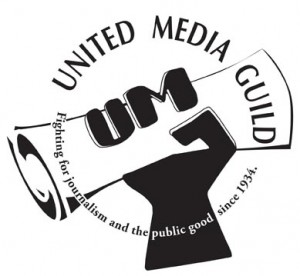The United Media Guild is gladly helping The Newspaper Guild’s “Right to Report” project. At the national level your union is supporting a national shield law to project journalists doing their job.
TNG-CWA also called on President Obama and Attorney General Eric Holder “to stop and renounce their actions threatening America’s free press.”
Our Springfield unit chair, Dean Olsen, is assisting the “Right to Report” fact-finding effort. He is an award-winning reporter for the State Journal-Register.
Lena Williams, a retired New York Times reporter and former vice president of the New York Guild, wrote this overview of the issue for TNG-CWA:
More than ever, journalists around the country are being subpoenaed and threatened with imprisonment for doing their jobs and standing by their principles. The increased pressure to reveal confidential sources or testify in court strikes at the heart of the First Amendment guarantee of a free press.
Forty states and the District of Columbia have passed shield laws, but the vary in the form and scope of protections. Some apply to civil but not criminal proceedings. Others protect journalists from revealing confidential sources but not other information.
A federal shield law, the Free Flow of Information Act, has been languishing in Congress since 2007 and appears to be months away from a vote in the Senate. The law prohibits a federal entity – employees of the judicial or executive branch or an administrative agency of the federal government – from “compelling a covered journalist” to disclose protected information.
The Newspaper Guild-CWA and more than 50 media companies and organizations are urging Senate leadership to bring it to the floor for a vote.
The urgency to enact Federal legislation comes in the wake of the Supreme Court’s refusal to hear an appeal from New York Times reporter, James Risen.
In 2011, federal prosecutors subpoenaed Risen to testify about the source of classified information used for his 2006 book, “State of War: The Secret History of the CIA and the Bush Administration.” Risen has refused to identify the source and is facing what could be a lengthy jail sentence.
“The Supreme Court’s refusal to hear Risen’s appeal underscores the vital need for a national shield law, legislation that the White House claims to support,” Guild President Bernie Lunzer said. “Many journalists report that the government’s crackdown in the absence of such a law is having a chilling effect on whistleblowers with information about government waste and wrongdoing. The people most harmed are American citizens, as the blinds are pulled on the window to transparent government.”
The Free Flow of Information Act will help, but not solve, all of the challenges modern-day journalists face on the job, and includes flawed approaches to fixing a fundamental problem.
The bill establishes a qualified privilege for journalists to withhold confidential information “unless a judge makes a determination to compel disclosure” under conditions that apply differently in criminal or civil matters or determines that “all reasonable alternative sources” have been exhausted.
“Covered journalists” are defined as those working for media organizations, outlets or services that disseminate news or information by various means. What is uncertain is whether the law would cover bloggers or students.
Courts have already weighed in on cases to determine when shield laws should apply to people working for non-traditional media outlets or as independent freelance writers. In a 2010 case, the New Hampshire Supreme Court adopted a broad definition of journalists to include an online website. One year later, a U.S. District Court in Oregon ruled that a blogger was not a journalist and not protected by the state’s shield law.
That legal quagmire is affecting a growing number of bloggers, said Sonny Albarado, a past president of the Society of Professional Journalists, which has lobbied for passage of a federal shield law.
“In the national shield law there is a definition as to what constitutes an act of journalism,” Albarado said in a recent telephone interview from his offices at the Arkansas Gazette in Little Rock where he supervises a team of investigative reporters. “There are members of the Senate who don’t want bloggers or those without news organizations to be covered. There is a reluctance because it’s so amorphous.”
Albarado said his members believe the Senate should focus on whether the person was engaged in disseminating information to a broad audience or “just standing on a soap box.”
“I’ve talked to journalists who say we ought to define who deserves to be called journalists,” said Albarado. “I don’t feel that way but I see their point.”
Last week, Rep. Alan Grayson, D-Fla, pushed an amendment to an appropriations bill through the House that would block the Justice Department from compelling journalists to testify about confidential sources and information. The amendment passed by a vote of 225-183.
“It is completely incongruous to say we have freedom of the press but the federal government can subpoena your sources and put them and you in prison if you don’t comply,” Grayson said.
For now all journalists can do is wait and see.
The Senate appears in no hurry to push the bill to the floor for a vote and is likely to recess for the summer without taking action on the law, leaving journalists in limbo and Risen a step closer to jail.
